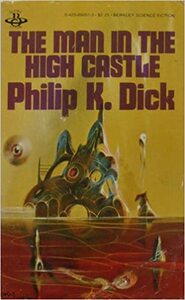Take a photo of a barcode or cover
dark
mysterious
fast-paced
Plot or Character Driven:
Character
Strong character development:
Complicated
Loveable characters:
Complicated
Diverse cast of characters:
Yes
Flaws of characters a main focus:
Yes
adventurous
funny
mysterious
tense
medium-paced
Plot or Character Driven:
Character
Strong character development:
Yes
Loveable characters:
Yes
Diverse cast of characters:
Yes
Flaws of characters a main focus:
Complicated
I'm surprised this book doesn't have a higher rating!
I actually liked the I Ching element and how it held the story together. Also enjoyed how the characters’ stories intertwined, and thought the the book is very meta. Especially tackling so many differnet topics at once.
I actually liked the I Ching element and how it held the story together. Also enjoyed how the characters’ stories intertwined, and thought the the book is very meta. Especially tackling so many differnet topics at once.
It was a bit difficult to get into at first, but I was drawn in by the action in the end, plus the shift in focus to Juliana. I originally found the character kind of insufferable, but she ended up being one of the most interesting parts of the story.
challenging
dark
mysterious
reflective
slow-paced
Plot or Character Driven:
Character
Strong character development:
Yes
Loveable characters:
No
Diverse cast of characters:
Yes
Flaws of characters a main focus:
Yes
Fizzles out at the end
dark
mysterious
reflective
tense
medium-paced
Plot or Character Driven:
A mix
Strong character development:
Yes
Loveable characters:
Complicated
Diverse cast of characters:
Yes
Flaws of characters a main focus:
No
I'm kind of conflicted in writing this review. I really liked the book - it's a good example of the implication of alternative history, and a well-thought one.
The political landscape of the world Dick imagined, divided by nazi Germany and the Imperial Japan, is at least interesting as the characters themselves.
Yet, I feel like there are some drawbacks and pitfalls preventing me to give the book more than three stars. First of all, the book is heavily influenced of Dick's fascination with Japan, glossing over war crimes and practices that were used during WWII by the imperial forces. In second place, I cannot help but feel that the plot unravels poorly. Juliana's arc slowly deranges from the thematic core of the novel. The relationship with I-Ching, that is really interleaved with the novel, is at the same time interesting and a little baffling, since it's not clear what Dick wanted to convey.
The political landscape of the world Dick imagined, divided by nazi Germany and the Imperial Japan, is at least interesting as the characters themselves.
Yet, I feel like there are some drawbacks and pitfalls preventing me to give the book more than three stars. First of all, the book is heavily influenced of Dick's fascination with Japan, glossing over war crimes and practices that were used during WWII by the imperial forces. In second place, I cannot help but feel that the plot unravels poorly. Juliana's arc slowly deranges from the thematic core of the novel. The relationship with I-Ching, that is really interleaved with the novel, is at the same time interesting and a little baffling, since it's not clear what Dick wanted to convey.
Very vanilla and very slow for such a short book, boring characters, a very commercial story, the world is not detailed enough IMHO.
informative
mysterious
reflective
slow-paced
Plot or Character Driven:
Character
Strong character development:
Complicated
Loveable characters:
Complicated
Diverse cast of characters:
Yes
Flaws of characters a main focus:
Complicated
The choice to set this in the Japanese territory works so well because all the intense Nazi developments are ticking away in the background. I was invested in characters even when I didn't like them. Although I'm not sure about the I Chang parts of the story. It was uncomfortable in a unique way because it was full of prejudice but for a reality that hasn't happened.
Philip K. Dick’s The Man in the High Castle is more than an alternative history – it’s a philosophical perspective on mortality, injustice, and futility. Told through the complicated experiences of 5 independent souls souls, Dick’s fiction begins as a terrible imagining and ends as a startling reflection.
Readers will have to manage to stay afloat over Dick’s sudden use of German and ideological musings, which distract from the author’s well-earned immersion. Dick also wrestles with the powerful ideas contained in this novel, some of which may be too big for this book’s britches, but Dick navigates those ideas well enough to whet your appetite and raise your eyebrow. And while the main protagonists are difficult to like, through some nuanced writing, Dick makes you want to seek closure page after page.
But be warned: You can come for the morbid curiosity, but you’ll stay for the existential ruminations.
Readers will have to manage to stay afloat over Dick’s sudden use of German and ideological musings, which distract from the author’s well-earned immersion. Dick also wrestles with the powerful ideas contained in this novel, some of which may be too big for this book’s britches, but Dick navigates those ideas well enough to whet your appetite and raise your eyebrow. And while the main protagonists are difficult to like, through some nuanced writing, Dick makes you want to seek closure page after page.
But be warned: You can come for the morbid curiosity, but you’ll stay for the existential ruminations.
Reseña completa: http://laestanteriadeithil.blogspot.co.uk/2014/09/el-hombre-en-el-castillo-phillip-k-dick.html
Opinión personal: El hombre en el castillo me ha gustado mucho, me ha resultado denso y extraño, sobre todo al principio. Sobre todo por la forma de escribir de Dick. Y aunque le he ido cogiendo el punto, no ha dejado de ser denso y extraño. Razones por las cuales me resultaría imposible recomendar este libro a nadie. Siquiera a esas personas a quien mejor conozco sus gustos o lecturas. Es sencillamente demasiado fuera de lo común, y eso es algo bueno. Creo que es muy difícil encontrar una lectura igual. Y cosas como el final, desde luego no ayudan. Eso sí, el trasfondo y la forma de presentarlo es sencillamente sublime y a mi forma de ver totalmente coherente. Si la premisa de qué pasaría si lo vencedores fueran los vencidos os animo a coger el libro sin lugar a dudas.
Opinión personal: El hombre en el castillo me ha gustado mucho, me ha resultado denso y extraño, sobre todo al principio. Sobre todo por la forma de escribir de Dick. Y aunque le he ido cogiendo el punto, no ha dejado de ser denso y extraño. Razones por las cuales me resultaría imposible recomendar este libro a nadie. Siquiera a esas personas a quien mejor conozco sus gustos o lecturas. Es sencillamente demasiado fuera de lo común, y eso es algo bueno. Creo que es muy difícil encontrar una lectura igual. Y cosas como el final, desde luego no ayudan. Eso sí, el trasfondo y la forma de presentarlo es sencillamente sublime y a mi forma de ver totalmente coherente. Si la premisa de qué pasaría si lo vencedores fueran los vencidos os animo a coger el libro sin lugar a dudas.
Finally, against all odds, I have finished this book. Typically a fan of the regular PKD brand of bizarre and otherworldly, I picked this book up at a store when I needed something to read last fall. I slogged my way through boring conversation after boring conversation. I skimmed over every strangely racist or misogynistic comment he made as being “in character” of the speaker. I put it down for a very long time and then forced myself to finish because if it ended as badly as it was at the start, at least I could have some validity to a bad review. I say this with my whole chest, knowing that it would piss PKD off to no end:
Thank God I am done. Thank God.
If you want to read a book where a bunch of businessmen talk about nothing for 230 pages and then struggle with mortality for the last 40, you got it right here. If you want to read a book where the author puts himself into it as a character that is functionally an urban legend while also being the most celebrated popular author of the time, you got it. If you want to see the most twee “plot twist” ever affect absolutely none of the paper-thin main characters that you could not give a single shit about, here you go. You wanna see PKD say some cool stuff about the state of our world for a while? Read a different book.
I will give this two stars because he had some decent points about futility at the end, but if I’m being honest, he’s done the same thing so much better in any of the other books of his that I’ve read. And, if this is something he intended to do- create a book that is so useless and pointless it leaves the reader feeling worse than when they started- certainly he could have done that in less than three hundred pages. I understood that to be the point a few, agonizingly boring chapters in.
TLDR? Gratuitous boredom awaits you until he decides to actually say something in the last few pages. And even then… ehhhh.
Thank God I am done. Thank God.
If you want to read a book where a bunch of businessmen talk about nothing for 230 pages and then struggle with mortality for the last 40, you got it right here. If you want to read a book where the author puts himself into it as a character that is functionally an urban legend while also being the most celebrated popular author of the time, you got it. If you want to see the most twee “plot twist” ever affect absolutely none of the paper-thin main characters that you could not give a single shit about, here you go. You wanna see PKD say some cool stuff about the state of our world for a while? Read a different book.
I will give this two stars because he had some decent points about futility at the end, but if I’m being honest, he’s done the same thing so much better in any of the other books of his that I’ve read. And, if this is something he intended to do- create a book that is so useless and pointless it leaves the reader feeling worse than when they started- certainly he could have done that in less than three hundred pages. I understood that to be the point a few, agonizingly boring chapters in.
TLDR? Gratuitous boredom awaits you until he decides to actually say something in the last few pages. And even then… ehhhh.


